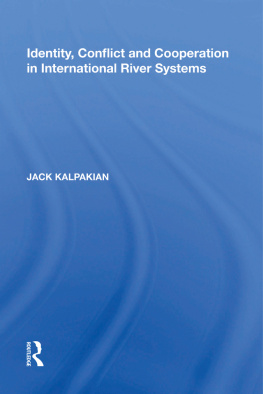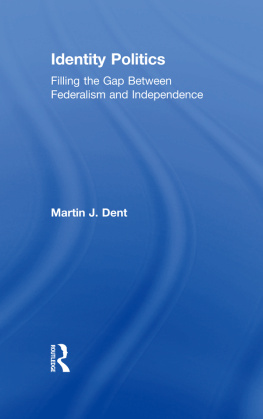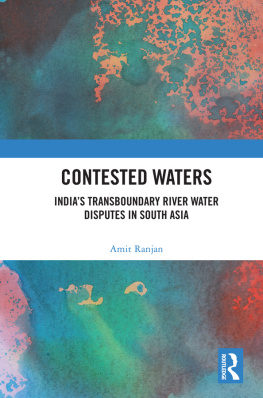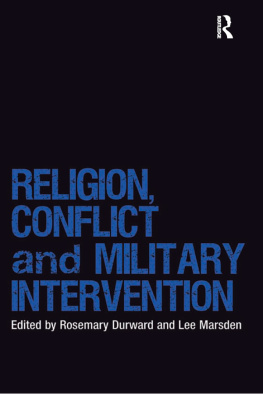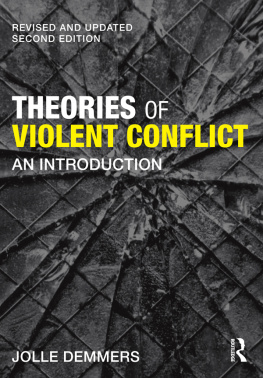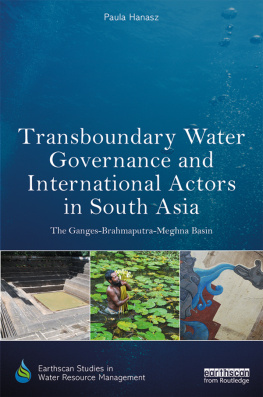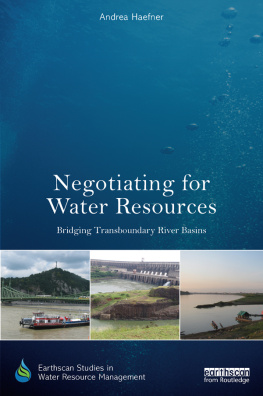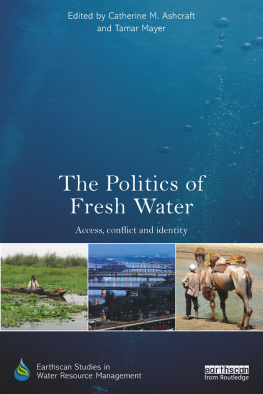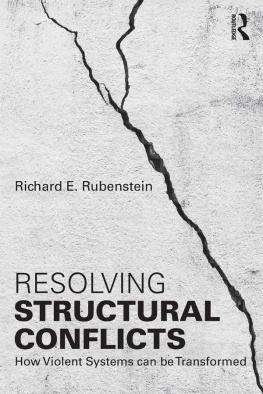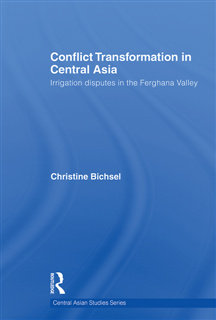Identity, Conflict and Cooperation in International River Systems
Dedicated to Ms Lan Troung and Ms Melanie Orhant without whose research support this work would not have been completed .
Identity, Conflict and Cooperation in International River Systems
Jack Kalpakian
Al Akhawayn University, Morocco
First published 2004 by Ashgate Publishing
Reissued 2018 by Routledge
2 Park Square, Milton Park, Abingdon, Oxon OX14 4RN
711 Third Avenue, New York, NY 10017, USA
Routledge is an imprint of the Taylor & Francis Group, an informa business
Jack Kalpakian 2004
Jack Kalpakian has asserted his right under the Copyright, Designs and Patents Act, 1988, to be identified as author of this work.
All rights reserved. No part of this book may be reprinted or reproduced or utilised in any form or by any electronic, mechanical, or other means, now known or hereafter invented, including photocopying and recording, or in any information storage or retrieval system, without permission in writing from the publishers.
A Library of Congress record exists under LC control number: 2003048163
Notice:
Product or corporate names may be trademarks or registered trademarks, and are used only for identification and explanation without intent to infringe.
Publisher's Note
The publisher has gone to great lengths to ensure the quality of this reprint but points out that some imperfections in the original copies may be apparent.
Disclaimer
The publisher has made every effort to trace copyright holders and welcomes correspondence from those they have been unable to contact.
ISBN 13: 978-0-815-38960-6 (hbk)
ISBN 13: 978-1-351-15612-7 (ebk)
Most of the research for this work was completed during the 1990s as part of the author's Ph.D. dissertation. The field of International Relations was experiencing a revival of interest in resource-related issues such as oil and water. These substances were accorded substantial power in being able to set people against each other in war. Dire predictions were being made about the inevitability of war for control of water. Conflict for water was being seen as logical, rational and predictable.
It is in this context that the author began his work. Soon, the constant repetition of the assumption that water disputes lead to war led me to question orthodoxy. Would conflicts not have already occurred in regions with water scarcity? If the assumption held, it would have followed that we would have seen wars over water in arid areas. As a result, wars and political conflicts in three river basins were analyzed for a nexus to water disputes. The findings of that search were negative and these results form the core of this book. Instead of a physical substance, water, serving as a cause of the wars and political conflicts, the social construct of identity appeared repeatedly instead in the role of a causative agent.
Depending on one's perspective, this can either represent a redeeming or an utterly vain aspect of human nature. In all three basins, the states and groups engaging in war and political conflict have set identity as a core value. They practise a dynamic of exclusion and inclusion based on religious, ethnic, racial and linguistic belonging with catastrophic results for their respective populations. Part of the problem lies in the nature of the state, nation-state and the state-nation. The drive to give the state a purpose beyond its economic and social-service functions by invoking culture and its associated elements of religion and language led to conflicts not only with neighboring countries but also within the state. Minority groups opposed to homogenization policies revolted or placed themselves in opposition. This effort's observation that religion continues to be a very important aspect of conflict was confirmed by the tragedy of 9/11. I invite the reader to enjoy the tapestry of history and analysis I have attempted to weave and to criticize it when they feel a criticism is warranted. I would like to thank my family, Dr. Regina Karp, Old Dominion University and its Graduate Programs in International Studies, the Institute for the Study of World Politics, A1 Akhawayn University, the Armenian Relief Society, the Armenian General Benevolent Union, Mr. Alae Eddin Serrar, Mr. Said Mahi, and Ms Josephine Bulbulian for all their help and support.
Like any other field operating within the greater framework of international relations, the field of studying international river systems reflects the wide diversity of theoretical thought in the parent field. The vast majority of the field is either Realist or post-Realist. With the exception of a small school of alternative literature, the field holds that water disputes are a cause of serious conflict. Regarding theory, the book's conclusion is dedicated to applying the lessons learned from the rivers to international relations theory through commentary on the major schools. Since this is not a book aiming to construct a theory, the commentary will be of a general nature. The commentary will not delve into the nuances of theory. It is more important to learn what the rivers say about the theories and not vice versa.
The assumption that water disputes lead to conflict is attractive, because we seek to ascribe rational reasons for conflict. Making war to get or keep water appears to be a rational act at first glance. This point of view is not informed by the insights of hydrology which suggest that it is better and cheaper to cooperate in the pursuit of water. Furthermore, water supplies can be generated or revitalized through recycling, reduced use, imports, desalinization, and the creation of "virtual water" through trade with water-rich states. More drastic measures include a shift to drought-resistant animals, reduced family sizes, and the immigration of a part of the population. Serious conflicts and war are almost never seen as a solution to a water dispute. Serious conflict is reserved for matters that touch people's identities such as their language, history, heritage, and self-image. Water, while vital, is not a cause of conflict. The argument that there is a link between the water disputes and serious conflict is largely non-historical and reliant on projections of future water shortages. Appreciation of the permanence of droughts in human history is largely missing. Water has been a precious commodity for a very long time.
The continued relevance of freshwater for civilized existence has attracted the attention of international relations analysts seeking to explain the conflicts between Israel and the Arab states as products of a dispute over the waters of the Jordan River. Analysts like Joyce Starr contend that the 1967 war was caused by Israel's need for water and that the future holds more water wars.into the form of a hypothesis and tested. This book fills this glaring gap in the literature.
Testing the hypothesis through a structured case study method leads to a completely unforeseen result. Water disputes do not cause serious conflicts. The river basins used to test the assumption are in some of the world's most war-prone areas: the Nile, the Tigris-Euphrates and the Indus. The case studies have also been biased towards arid regions. This bias is designed to favor the hypothesis that disputes over water cause serious conflict. Despite this built-in bias, the book shows no causative link between disputes over water and serious conflict. The two countries most dependent on outside sources of water are in Europe and Latin America, but Austria and Paraguay do not have conflicts over water disputes with their neighbors.

